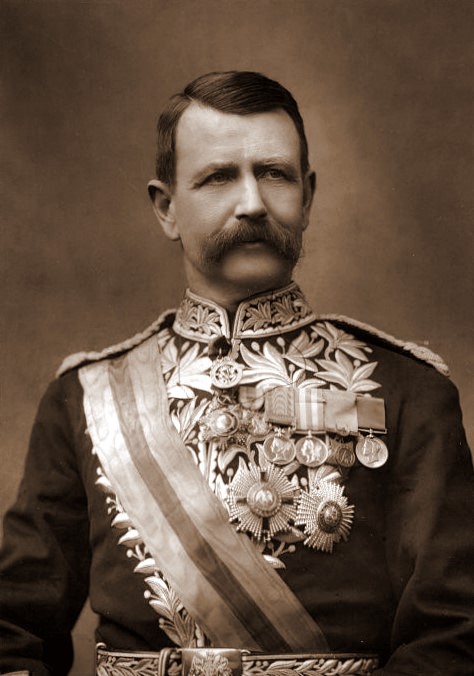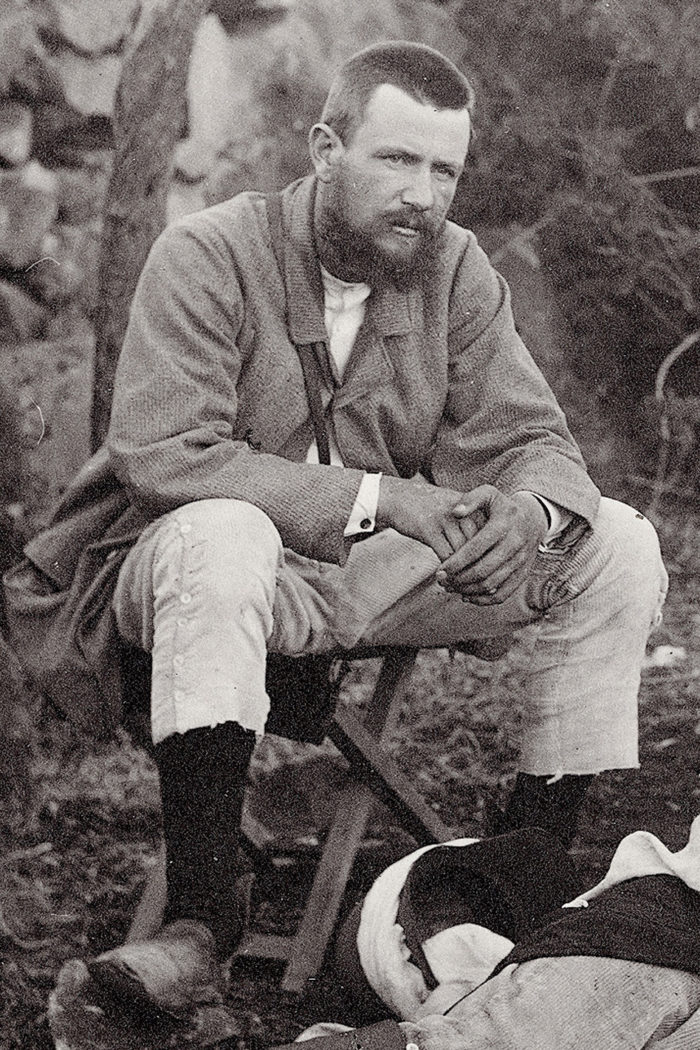by Brad Ricca
True Raiders: The Untold Story of the 1909 Expedition to Find the Legendary Ark of the Covenant tells the story of Monty Parker, a British rogue nobleman who, after being dared to do so by Ava Astor, the so-called “most beautiful woman in the world,” headed a secret 1909 expedition to find the fabled Ark of the Covenant. Like a real-life version of Raiders of the Lost Ark, this incredible story of adventure and mystery has almost been completely forgotten today. Read on for an excerpt.

Jerusalem, 1867
From the valley, the mountain that rose in the half light before them seemed to be getting closer; but sometimes, it looked as if it had only been painted there, in the background of things, by some artist’s brush. The hour was late and the sky was still blue, though the entire slope of the mountain was already cast in shadow. Like so many things around Jerusalem—the places, the people, the stories—the hill was something ancient yet real, a physical anchor to an unfathomable past that extended all the way back to the very times of God. As the sun began to slowly pass from sight, the sky and the sharp peak began to form a single dark image, its outline flecked with light.
Three sets of boots splashed in a line through the shallow pool on the ground, uncaring of where they stepped. Like the mountain, it too was swallowed in darkness. Only the contrast of stacked rocks here, a tuft of shrubbery there gave it any definition. As the three men stopped and looked into the empty stone basin, they saw a tunnel descending downward.
They lit their candles one by one. Sergeant Birtles went first into the empty pool. He was large and strong, with a full brown beard that seemed to move with every breath like some great snoring bear. His heavy white shirt was tucked into his steel blue pants, with two broad red stripes running down the legs. Behind him was a local fellah with a large black beard, dressed in robes and a turban that had not been white for some time. As they entered the low tunnel, Birtles pulled out his brown canister and began running his measuring tape along the stone walls. He fixed it with the thumb of his leather glove as his candle flickered over the tiny printed numbers. They walked down rather easily, even as the hard edges of the stairs crumbled like bits of crusty bread.
Behind them, standing at the tunnel’s opening, was a man, though he was little more than a silhouette in a pith helmet. He followed them down and came into view, with his compass and field book clutched to his chest. He crammed his equipment under his arm and held his candle up. Captain Charles Warren looked young for his age, with dark eyes and a handsome face under close-cropped hair and a beard. His pencil held firmly in his teeth, he was sweating like a butcher, but he looked perfectly composed. There was a look in his eye not of madness, not entirely, but of a marked enthusiasm. Warren looked at his companions. The romance of the moment was not lost on any of them, but enough was enough. It was time to get on with things.
They walked slowly, with their backs almost parallel to the cool walls. As they made their way in, the strange midnight of the tunnel devoured all but the pooling circles of light from their candles. The ground had a thin crust to it. Warren pressed the toe of his boot onto it to make sure it would hold. There was a little water on the ground, but certainly nothing to be worried about. They proceeded slowly down through the tunnel. They walked, plain sailing, for about three hundred feet.
Captain Warren stopped the fellah’s torch with his hand and slowly directed it toward the left wall. There, under the wavering light, were rough marks gouged into the stone. Warren looked at Birtles, who understood his thoughts immediately. These scrapes had been made by a chisel a long time ago. Birtles pulled at his open collar. Warren could see the sweat dripping from his forehead. The deeper they got, the more stifling it became. Warren gave the ceiling a wary look. As if the heat was not enough, the tunnel seemed to be getting smaller. Jagged crags in the walls were prodding into their backs.
They moved forward even more slowly, hunching over further. Birtles kept unrolling his never-ending tape. Soon, they were reduced to a single file. Captain Warren ran his own tape from ceiling to floor. He took his pencil from his mouth and began scratching numbers into the small notebook. The ceiling, which was sixteen feet at the great entrance, was now down to four feet, four inches. Warren then measured the width of the tunnel. He focused on the small black number on the tape. It was now a mere two feet across. Captain Warren took the candle and pushed it forward into the blackness. If this tunnel was what he thought it was, then it made sense that it did not always have to be tall enough for walking. But that was not going to make it easy. Warren looked ahead. The tunnel continued in a wavy line to the east. Birtles crouched forward first, unwinding his tape, and they moved on.
When they reached four hundred and fifty feet in, the passage was only three feet, nine inches tall. Warren again marked it into his notebook with his little pencil.
“Wait,” he said.
Warren moved to the front. He moved his candle higher in the air, but where it should have met the ceiling, it continued even higher. The tunnel seemed to be growing again. Warren stepped forward and looked upward. The low ceiling gave way to a shaft that led upward at a steep angle. He looked for a handhold or ridge, but there was none. He stretched out his arm. The candle fought against the darkness, but its power was limited. The tunnel went up, but to where? Warren looked down at his old black boots. The small stream at their feet seemed to be growing. Warren made a note of the shaft, and they continued.
Several minutes later, Birtles stopped in his tracks, bumping his head in the process. He cursed in the half-darkness. Warren edged his way to the front and saw the reason: they had run into a wall. Birtles grunted. They would have to turn back. Warren could hear the fellah breathe a sigh of relief. But Warren again reached forward, and this time lowered his candle. The soft glow fell down the side of the wall to reveal more darkness. The tunnel had not stopped; it had only gotten smaller. Warren made a quick measurement: it was only two feet, six inches high. He heard another long sigh.
They dropped to all fours and moved forward, crawling in the skinny rivulet of water. Warren tried not to think of the sheer weight of rock and dirt above them, just outside the city of Jerusalem. He knew there were farms and houses up there in the village of Silwa filled with people who slept, oblivious to their night crawling.
Warren looked down. The water seemed to have risen again, now reaching their hips, but it was still only about four inches deep. In the stale air, its iciness was refreshing. Warren washed some over his face and shook it off. When he opened his eyes, he saw Birtles once again stopped, his face frozen in fear. Warren felt something brush against his arm.
There was something in the water.
Copyright © 2021 by Brad Ricca.

Brad Ricca is the author of the Edgar Award-nominated Mrs. Sherlock Holmes, Olive the Lionheart, and Super Boys, winner of the Ohioana Book Award for Nonfiction. He won the St. Lawrence Book Award for American Mastodon. Ricca lives in Cleveland.

